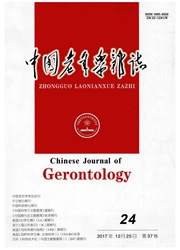

 中文摘要:
中文摘要:
目的用概化理论的G研究方法对慢性病患者生命质量测定量表体系共性模块(QLICD.GM)生理、心理和社会功能三个领域进行评价。方法对8种慢性病患者在入院时和出院时进行两次测试,采用概化理论的G研究方法计算不同领域的变异度分解。结果G研究表明,生理领域研究对象的变异效应最大,占总方差比重的81%;心理领域,条目、研究对象和时间交叉作用的变异效应最大;在社会功能的领域,条目与患者的交叉作用效应最大。结论慢性病患者生命质量测定量表体系共性模块不同的领域总的拟合效果较好,有较好的信度。社会功能领域条目有待进一步修订完善。
 英文摘要:
英文摘要:
Objective To analyze the physiology, psychology and society function domains of general module for the system of quality of life for chronic disease using generalization theory (GT) G method. Methods The variability of different domains were calculated by generalization theory (GT) G method at admission and leaving hospital. Results G research indicated that in the physiology domain , the variation effect of the research objects was the largest, accounting for 81% of the total variance. In the psychology domain, the variation effect of crossing affect of item, research objects and time were the largest. In the society function domain, crossing affect of item and research objects was the largest. Conclusions Fitting effect and reliability of general module of quality of life system for chronic disease are good, but some items of society function domain also have to revise .
 同期刊论文项目
同期刊论文项目
 同项目期刊论文
同项目期刊论文
 Development and Validation of the General Module (QLICD-GM) of the System of Quality of Life Instrum
Development and Validation of the General Module (QLICD-GM) of the System of Quality of Life Instrum Development and Validation of a Quality of Life Instrument for Patients with Drug Dependence: Compar
Development and Validation of a Quality of Life Instrument for Patients with Drug Dependence: Compar 期刊信息
期刊信息
